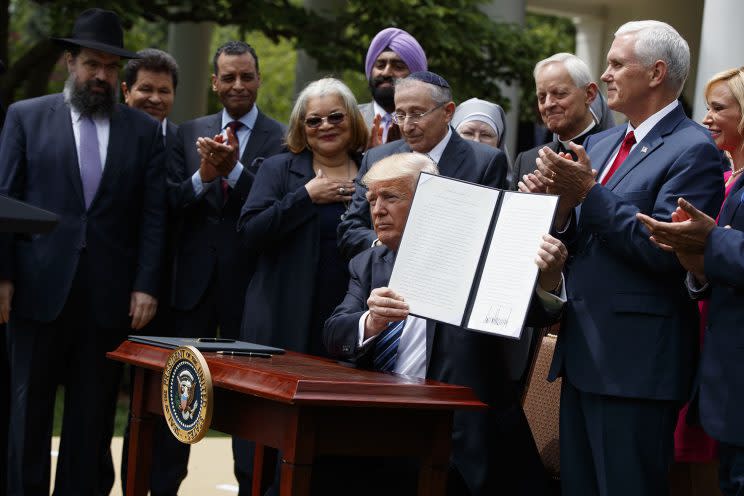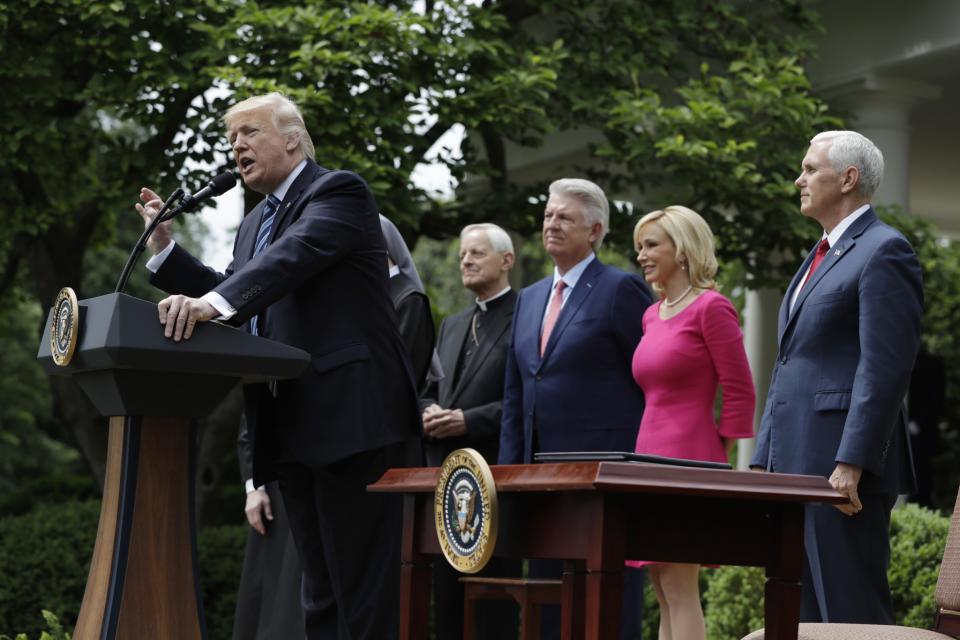Trump’s executive order disappoints religious conservatives
WASHINGTON — An executive order by President Trump meant to reward religious conservatives for their support of him in last year’s election fell short of what many had hoped for and drew widespread criticism on Thursday.
“The executive order on the whole looks to accomplish very little of substance, against the backdrop of a lot of show,” said John Inazu, a professor of law and religion at Washington University in St. Louis and author of “Confident Pluralism: Surviving and Thriving Through Deep Difference.”
Ryan T. Anderson, a Heritage Foundation scholar who is a leading advocate for religious conservatives, wrote that Trump’s order “does not address the major threats to religious liberty in the United States today.”
Trump supporters argued that while the president’s order did not address all the concerns of religious conservatives, it was a first step.
“This is a multistep process that will lead to accomplishing all our religious freedom objectives,” Tony Perkins, head of the Family Research Council, said in a text message.

The biggest disappointment for religious conservatives was that Trump did nothing to assist them in ongoing conflicts with gay rights advocates that have played out, most conspicuously, over the rights of Christian bakers or photographers who do not want to provide services for same-sex weddings. The most pressing concern for most religious conservatives is what they see as growing hostility to their religious beliefs about sexuality and marriage.
“Twice now, he has failed to stand up for common-sense policy on religious liberty when liberal opponents lashed out against it,” Anderson wrote.
Anderson pointed to the leak in February of an earlier draft version of the executive order, which did include language that would have given religious conservatives protections in disputes with the LGBT community. LGBT groups denounced the language in that draft as bigotry.
Anderson said that after the draft leaked, Trump “caved to the protests of liberal special interest groups.”
And he said the language that was eventually signed by Trump in a Rose Garden ceremony at the White House on Thursday morning was “a mere shadow” of the leaked draft and is “woefully inadequate.”
The Alliance Defending Freedom, a conservative legal group, said in a statement that while “President Trump stated that the first priority of his administration would be to preserve and protect religious liberty,” the order issued Thursday “recalls those campaign promises but leaves them unfulfilled.”
The ADF said that “no specific relief is offered” to people like Donald Vander Boon, a west Michigan meat plant owner whose business is under threat of closure by the U.S. Department of Agriculture because Vander Boon placed pamphlets explaining his conservative views on marriage in an employee break room.

As for the complaints of religious groups who felt unduly burdened by the mandate in Obamacare to provide contraception in employer-sponsored health insurance plans, the Trump executive order merely directed federal agencies to “consider issuing amended regulations, consistent with applicable law, to address conscience-based objections to the preventive-care mandate.”
That language also fell far short of what the religious right had hoped for.
Trump’s executive order focused most specifically on weakening the so-called “Johnson Amendment,” which deals with the ability of pastors to speak about political matters and endorse political candidates from the pulpit or using church resources. Current law states that churches could lose tax-exempt status if the Internal Revenue Service finds that they are “directly or indirectly participating in, or intervening in, any political campaign on behalf of (or in opposition to) any candidate for elective public office.”
Yet this issue is far from the minds of most religious conservatives.
“In the universe of religious freedom issues facing our country today, the Johnson Amendment doesn’t come even close to the top,” Inazu said in an email. “As a practical matter, the Johnson Amendment has almost always been minimally enforced.”
“My hunch is that one or two of Trump’s ‘religious advisers’ mentioned the Johnson Amendment early in the campaign. But how and why they focused on that issue is beyond me,” Inazu said.
Even those who care about the Johnson amendment, such as the ADF, said that the problems presented by the law require legislation and that an executive order does little to fix it.
Many conservatives suspected that Vice President Mike Pence, whom they see as an ally, was outmaneuvered by the president’s daughter, Ivanka, and her husband, Jared Kushner, who are influential advisers with top White House jobs. The two are widely believed to be sympathetic to the cause of gay rights.

As governor of Indiana, Pence championed a broad religious liberty bill but watered it down after widespread criticism, angering his conservative allies. Now that he’s in the White House, he was expected to fight hard for a strong executive order as a way of making amends to that wing of the party.
Last week, a Republican Senate aide told me the word about the religious liberty order on Capitol Hill was that “President Jared has it on hold.” The aide added: “I haven’t seen any evidence that Pence has the pull to trump Jared.”
White House spokeswoman Sarah Sanders downplayed the role of Trump’s daughter and son-in-law in a briefing with reporters.
“I’m not aware of any specific role they may have played,” Sanders said. “I think that they are supportive of the president’s decision on this. I don’t think its any secret this is something that he campaigned on for a very long time, and they joined him on the campaign trail every day, and so I think that they would be supportive in this process.”
A White House official who spoke to Yahoo News about the crafting of the order on condition of not being named said that “the president believes religious organizations have been unfairly targeted, but the president wants to make sure the reverse doesn’t happen, so great care was taken to make sure this was tightly defined.”
After eight years of an administration seen as unsympathetic to their concerns, religious conservatives were hoping for more than a symbolic victory. Even so, “this is just the first bite at the apple, not the last,” said Ralph Reed, chairman of the Faith and Freedom Coalition, in a statement.
But Robert George, a Princeton professor who is one of the most prominent voices in favor of traditional marriage and opposed to gay marriage, was unequivocal in his judgment of what had happened.
“The religious liberty executive order is meaningless. No substantive protections for conscience. A betrayal. Ivanka and Jared won. We lost,” George tweeted.
Hunter Walker contributed reporting.
Read more from Yahoo News:
Comey dismisses gossipy WikiLeaks coverage as ‘intelligence porn’
Trump fires back at Clinton: ‘Perhaps Trump just ran a great campaign?’
Comey says he is ‘mildly nauseous’ over possibility his October letter led to Clinton loss
As Trump prepares order on religious liberty, Pence’s credibility with evangelicals is at stake



